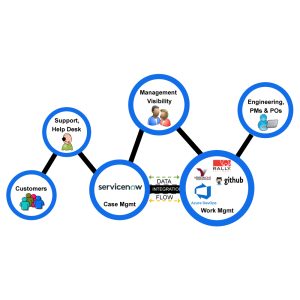The financial services sector is undergoing a seismic shift. Pressured by regulatory demands, rising customer expectations, and real-time market volatility, banks, insurers, and fintechs must accelerate their digital transformation to maintain a competitive edge. With profit margins tightening and compliance requirements rising, there’s an urgent need to eliminate inefficiencies and increase agility.
Traditional data silos, outdated workflows, and legacy systems like IBM IMS (Information Management System) are no longer sufficient to handle the scale and complexity of today’s financial operations. Manual operations create bottlenecks, limit visibility, and hinder real-time decision-making—putting firms at a significant disadvantage.
Enter intelligent automation. Unlike rule-based automation of the past, today’s AI-powered solutions can interpret data, recognize patterns, learn from outcomes, and assist in complex decision-making. IBM Watson Studio and Watson Knowledge Catalog represent two of the most powerful tools enabling this transformation. These platforms enable teams to build scalable, trusted AI models while ensuring enterprise-wide data governance and compliance.
When implemented together, Watson Studio and Watson Knowledge Catalog form a robust foundation for intelligent financial automation. They provide a pathway for organizations to move from reactive operations to predictive, proactive financial strategies. As a trusted IBM Solution Partner, Nexright has helped financial enterprises across APAC modernize legacy infrastructures, improve data transparency, and adopt AI-powered workflows using these very tools.
This blog is your comprehensive guide to understanding how IBM Watson Studio and Watson Knowledge Catalog can be strategically deployed to transform your financial services operations.
What is IBM Watson Studio?
IBM Watson Studio is a data science and machine learning platform designed to help teams build, train, deploy, and manage AI models efficiently. It’s crafted for both citizen data scientists and seasoned developers, offering an intuitive experience whether you’re coding in Python, R, or using visual tools like AutoAI and SPSS Modeler. The platform accelerates model development through built-in automation, open-source integration, and collaborative environments.
Key Capabilities:
- Model Development: Create and train predictive models using a flexible choice of tools—Python notebooks, R scripts, or visual flows. With AutoAI, you can automate feature engineering, model selection, and hyperparameter optimization.
- Collaborative Workspace: Foster cross-functional collaboration through shared projects, version-controlled assets, and visual dashboards that make outputs accessible across technical and business teams.
- Seamless Integration: Easily connect with IBM Cloud Pak for Data and legacy systems like IBM IMS, enabling access to both structured data (like customer transactions) and unstructured data (like scanned forms or call logs).
- Deployment Ready: Deploy models as REST APIs, batch jobs, or embedded analytics with real-time monitoring. Track model drift, performance metrics, and automate retraining to ensure sustained accuracy.
In the context of financial services, Watson Studio becomes the operational backbone for intelligent automation. It’s where raw data from disparate systems—core banking, credit scoring engines, actuarial platforms, and risk dashboards—is unified and transformed into predictive insights for fraud detection, risk modeling, customer segmentation, loan underwriting, and more. By supporting explainability and compliance features, it also ensures AI models meet financial regulatory standards while improving decision-making speed and confidence.
What is Watson Knowledge Catalog?
Watson Knowledge Catalog (WKC) is IBM’s enterprise data catalog and governance solution. It provides a centralized, secure location to discover, curate, categorize, and govern data assets—ensuring that teams across the organization can work from a single source of truth.
Core Features:
- Data Discovery: Scan enterprise data sources, including IBM IMS, and automatically classify assets based on metadata, lineage, and usage patterns. This simplifies how financial analysts, auditors, and modelers find relevant data.
- Data Lineage: Track data origins, transformations, and access histories to support regulatory audits and internal governance reviews.
- Policy Enforcement: Implement automated rules and access controls to ensure data privacy, regulatory compliance, and risk mitigation.
- Metadata Enrichment: Leverage AI to tag, annotate, and score data assets for enhanced searchability and insight.
For financial services organizations, WKC plays a critical role in ensuring the right data is used at the right time—especially when building models for credit scoring, risk assessments, or fraud detection. It ensures consistent data handling across departments and supports compliance with stringent regulations like GDPR, Basel III, or the Sarbanes-Oxley Act, making it a vital tool in any financial automation stack.
Why Combine Watson Studio and WKC?
Individually, IBM Watson Studio and Watson Knowledge Catalog (WKC) are powerful tools that empower organizations to unlock value from data. But when used together, they form a comprehensive, integrated ecosystem that drives intelligent automation, governance, and explainable AI—especially critical in financial services.
- Trustworthy AI at Scale: In highly regulated sectors like banking and insurance, data trust and transparency are non-negotiable. WKC ensures that all datasets used in Watson Studio are curated, governed, and traceable. Data lineage features help data scientists and auditors see exactly where the data came from, how it has been transformed, and what models it has influenced—essential for building AI systems that are not only powerful but also explainable and compliant.
- Frictionless Collaboration: Watson Studio and WKC provide a shared workspace where data engineers, compliance officers, and business analysts can operate in harmony. Data teams can publish curated datasets in the catalog with clear tagging, usage policies, and access controls. Analysts and modelers can quickly discover relevant, approved data without worrying about breaching security protocols—streamlining innovation while reducing risk.
- Seamless Model Lifecycle Management: With WKC serving as a governed data backbone, teams can build and deploy machine learning models in Watson Studio with confidence. From credit scoring and fraud detection to dynamic pricing and claims automation, every model pipeline can trace its data sources, transformations, and decision logic. This creates production-ready, auditable workflows that scale effortlessly.
- Accelerated Time-to-Value: The combined environment drastically shortens the path from data discovery to decision-making. Instead of spending weeks locating and validating data, teams can get started immediately—building reusable models, automating tasks, and deploying insights at the pace of business.
At Nexright, we have implemented this integrated stack across a range of financial use cases, including:
- Loan approval automation with explainable AI models
- Real-time insurance claims prediction
- Customer lifetime value forecasting
- ESG risk profiling in regulated investment portfolios
These deployments have delivered measurable improvements in time-to-decision, regulatory alignment, and overall operational efficiency—proving that when governance and AI development are unified, innovation becomes both safer and faster.
Building a Smarter Data Pipeline with IBM IMS
IBM Information Management System (IMS) has long been the reliable backbone of mission-critical applications in banking—managing vast amounts of transactional data with unmatched speed and reliability. From core banking and account servicing to loan processing and fund transfers, IMS continues to power many Tier 1 financial institutions. However, despite its strengths, IMS is often isolated from modern AI and analytics ecosystems due to its hierarchical data structure and on-premise legacy nature.
To remain competitive in a digital-first economy, financial institutions must find ways to unlock the insights buried in IMS and bridge it with cloud-native platforms like IBM Watson Studio and Watson Knowledge Catalog (WKC). That’s where Nexright’s expertise and IBM’s seamless integration stack come into play.
Here’s how this transformation unfolds:
- Modernizing IMS Data Ingestion: Using IBM’s native data virtualization and connectors, structured data from IMS (such as account balances, loan transactions, and customer histories) is securely extracted and ingested into Watson Knowledge Catalog. The ingestion process includes real-time metadata enrichment, where every dataset is automatically tagged with lineage, usage policies, and business terms—making it searchable and trustworthy for enterprise use.
- Enforcing Governance Across Legacy and Modern Systems: Once data lands in WKC, it enters a governed environment. Data stewards can define access rules, validate data quality, and ensure consistency across multiple use cases. This allows banks to treat IMS data like any other modern dataset—governed, compliant, and easily auditable, which is critical for passing regulatory scrutiny in areas like Basel III, GDPR, and APRA compliance.
- Enabling AI-Powered Decisions with IMS-Derived Features: With clean, trusted data now available, data scientists in Watson Studio can use it to train predictive models. IMS data can fuel high-impact AI applications—like identifying churn risk based on transaction behavior, customizing loan offers using historical repayment patterns, or scoring new applicants by comparing them to long-term performance cohorts.
- Accelerating Insight-to-Action Pipelines: The combined ecosystem drastically reduces the latency between data collection and action. Instead of waiting for batch reports from legacy systems, banks can operationalize real-time scoring and decision-making based on IMS data, embedded directly into customer-facing applications or internal workflows.
- Scaling with Cloud-Native Architectures: With the integration of IMS into IBM Cloud Pak for Data, organizations can scale workloads without replacing their core systems. This hybrid architecture ensures high performance and cost-efficiency while preserving existing investments in IMS infrastructure.
Nexright has helped leading banks modernize this data pipeline, turning once-siloed IMS environments into rich sources of insight and automation. From anti-money laundering (AML) use cases to dynamic pricing engines and customer service chatbots trained on decades of banking data—this integration is no longer aspirational. It’s executable, measurable, and critical for future-ready financial services.
Data Privacy and Compliance
With increasing regulatory scrutiny and customer expectations around transparency, data privacy has become a cornerstone of any financial automation strategy. In this high-stakes environment, adopting a privacy-first approach isn’t optional—it’s mandatory.
Watson Knowledge Catalog ensures:
- Role-based data access controls to limit exposure and enforce need-to-know access.
- GDPR-compliant masking, redaction, and automated policy enforcement to safeguard sensitive customer information.
- Comprehensive activity logging and data lifecycle governance to support audit-readiness and risk reporting.
Watson Studio supports:
- Bias detection and model explainability tools to ensure fairness and transparency in automated decisions.
- Fully auditable training pipelines that align with internal control standards.
- Seamless integration with IBM’s OpenPages for Governance, Risk, and Compliance (GRC) monitoring.
Combined, Watson Knowledge Catalog and Watson Studio empower financial institutions to automate responsibly—ensuring that data governance, accountability, and ethical AI remain front and center in every automation initiative. This is essential not just for meeting regulatory requirements, but also for maintaining trust with customers, partners, and oversight bodies.
How Nexright Supports Financial Automation
As a certified IBM Solution Partner, Nexright provides end-to-end services tailored for the unique demands of the financial services sector. Our approach ensures seamless integration of IBM’s advanced AI and data governance tools into real-world financial environments:
- Architecture Design: We align your business objectives with the right AI and automation strategies, leveraging IBM tools to ensure long-term scalability and ROI.
- Data Integration: Our team connects data across IBM IMS, SAP, Oracle, and other legacy platforms, centralizing it within Watson Knowledge Catalog for streamlined access and governance.
- AI Modeling: Using IBM Watson Studio, we help you build and operationalize predictive models for credit scoring, fraud detection, risk analytics, and more.
- Governance Setup: We implement Watson Knowledge Catalog with customized policies that adhere to industry-specific regulations such as Basel III, GDPR, and SOX.
- Operational Scaling: We support ongoing success with performance monitoring, model retraining, and intelligent workflow evolution to adapt to market or compliance shifts.
Our successful implementations across banking, insurance, and fintech prove our ability to reduce costs, improve compliance, and accelerate innovation. Whether modernizing core banking processes or scaling customer engagement, Nexright delivers automation that transforms financial services.
Future Trends in Financial Automation
The next generation of automation in financial services is evolving rapidly—bringing more intelligence, interactivity, and adaptability than ever before. Here’s how this transformation is expected to unfold:
- Conversational: Automation will become more human-like through integration with IBM Watson Speech to Text and Text to Speech. Financial institutions will deploy AI-powered virtual advisors that understand natural language, provide instant answers, and execute basic transactions—streamlining customer support while reducing operational costs.
- Composable: Solutions will increasingly be built on modular, interoperable components using technologies like Watson Nex and Red Hat OpenShift. This flexibility allows banks and insurers to rapidly assemble new services, scale innovations, and respond to changing market conditions without being locked into monolithic systems.
- Proactive: Automation will shift from reactive workflows to proactive systems that act on real-time signals. By analyzing live feeds from financial markets, customer behavior, and risk indicators, AI systems will trigger decisions automatically—such as adjusting credit limits, flagging compliance breaches, or personalizing offers in the moment.
By combining the power of IBM Watson Studio and Watson Knowledge Catalog, financial institutions are ideally positioned to embrace these trends. These platforms not only support advanced analytics and governance but also provide the flexibility needed to adapt to whatever comes next—making them essential tools for any enterprise planning to lead in the era of intelligent financial automation.
Turn Data into Decisions
The path to smarter financial automation begins with trusted data and scalable AI. IBM Watson Studio and Watson Knowledge Catalog, when deployed together, enable financial enterprises to:
- Modernize analytics pipelines: Streamline the ingestion, preparation, and analysis of vast financial datasets across departments and geographies.
- Enforce governance: Ensure data quality, lineage, and compliance across the lifecycle—crucial in regulated sectors like banking and insurance.
- Build explainable, auditable AI: Create models that deliver insights while maintaining transparency, interpretability, and regulatory adherence.
- Achieve cost savings and process acceleration: By automating manual processes and reducing the time needed for data analysis and decision-making.
Whether you’re looking to automate back-office operations, elevate customer engagement, or meet compliance at scale, the tools are already available—and proven. IBM’s suite of AI and data tools provide a robust, enterprise-grade foundation for digital transformation.
Ready to future-proof your financial automation strategy? Partner with Nexright to harness the power of IBM Watson and drive transformation with confidence.




